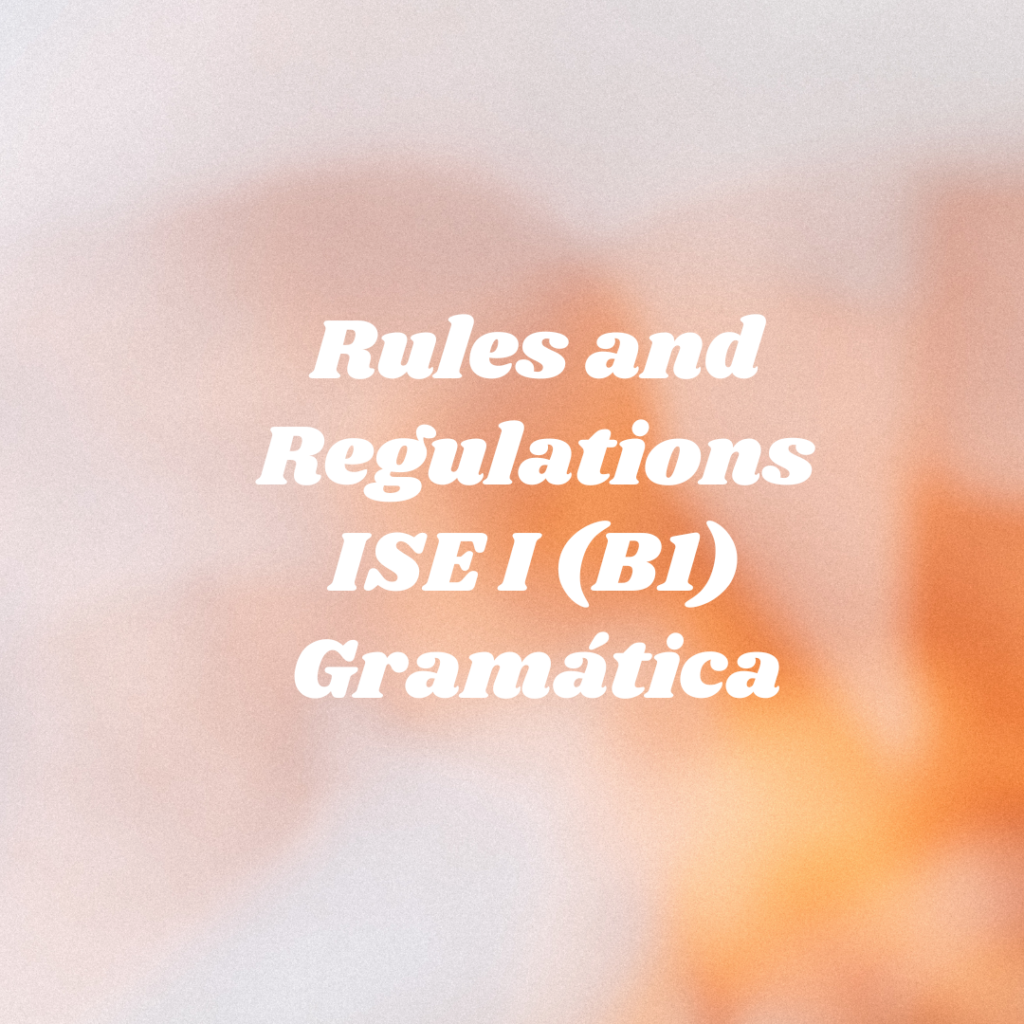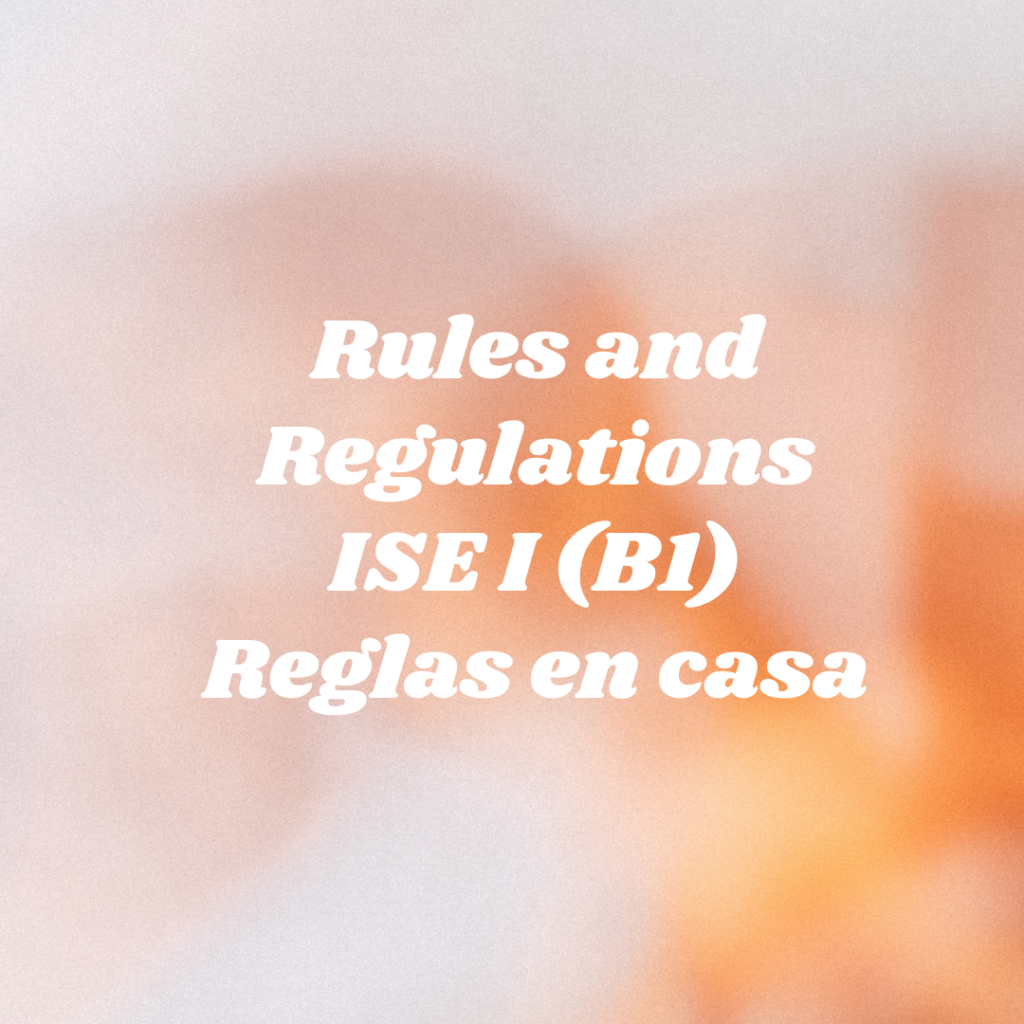Rules and Regulations ISE I (B1)
(CONVERSATION TASK): PART 1 (GRAMÁTICA)
Puesto que este tema es bastante amplio, los posts se dividirán en varios apartados.
El tema de Reglas y Regulaciones es uno de los más difíciles en la parte de Conversación, principalmente porque requiere conocer un vocabulario específico y saber utilizar verbos modales como MUST, HAVE TO, SHOULD, NEED, etc.
Podemos dividir este tema en los siguientes apartados:
| GRAMÁTICA | VOCABULARIO |
|---|---|
| Verbos modales (must, have to, should, need y sus formas negativas) | Reglas y regulaciones en casa |
| Segundo condicional | Reglas y regulaciones en el colegio / la universidad |
| Tiempos pasados | Reglas y regulaciones en el trabajo |
| Reglas y regulaciones en los medios de transporte | |
| Reglas y regulaciones en el restaurante / buenas modales de comer | |
| Importancia de tener reglas y regulaciones / que pasaría si no las tuviéramos | |
| Reglas y regulaciones en la carretera | |
| Reglas y regulaciones para proteger el medio ambiente | |
| Reglas y regulaciones en deporte | |
| Ir contra la ley |
Aunque parezca mucho, no os preocupéis; no es tan difícil si conocemos el vocabulario y las construcciones gramaticales que se esperan de nosotros. Sin más preámbulos, vamos al grano y empezamos con el contenido gramatical importante.
Como hemos mencionado, lo primero son los verbos modales. Según las regulaciones oficiales de Trinity, en B1 debemos saber expresar obligación, lo que significa que tenemos que conocer los verbos de obligación: MUST y HAVE TO; de necesidad: NEED, NEEDN’T y DON’T HAVE TO; y de consejo: SHOULD.
Hablando de los verbos modales MUST y SHOULD, debemos recordar que:
1. NO pueden usarse en tiempos verbales (es decir, no existen formas como I musted o He will should, porque no podemos usarlos ni en pasado ni en futuro).
2. Ni delante ni detrás de MUST o SHOULD podemos poner “to” (es decir, to must y should to son incorrectos).
3. Después de MUST y SHOULD tenemos que usar el infinitivo.
¿Y qué significan estos verbos?
| Verbo | Uso | Ejemplo |
|---|---|---|
| MUST | Se usa para expresar una obligación que viene de la persona | I must finish my homework before watching TV because I want to do well in school. |
| MUSTN´T | Se usa para prohibir | You mustn’t leave your dirty dishes in the sink. It’s a rule in our house. |
| HAVE TO | Se usa para expresar obligación debido a ciertas circunstancias | I have to take out the trash every evening because it’s part of my chores. |
| DON´T HAVE TO | Se usa para expresar falta de necesidad | You don’t have to wash the car this week; it’s already clean. |
| NEED | Se usa para expresar necesidad | I need to ask for permission if I want to go out with my friends. |
| NEEDN´T | Se usa para expresar falta de necesidad | You needn’t do the ironing today; we have enough clean clothes. |
| SHOULD | Se usa para dar consejos o decir que algo es “lo correcto” que te va a beneficiar | You should help with the chores to make things easier for everyone at home. |
| SHOULDN´T | Se usa para decir que algo no es recomendable | You shouldn’t be rude to your siblings; it’s important to be polite. |
¿Y en qué situaciones podríamos usarlos? Por ejemplo:
Examiner: Hello! Today we’re going to talk about rules and regulations. Are you ready?
Student: Yes, I’m ready!
Examiner: Great! Let’s start with school rules. Can you tell me about some rules that you have to follow at school?
Student: Sure. At my school, we have to wear a uniform every day. It’s a rule that everyone must follow. And, um, we must arrive on time in the morning. If we’re late, we could get in trouble.
Examiner: I see. So, you have to wear a uniform. How do you feel about that rule?
Student: Well, I don’t mind it too much, but sometimes I think we don’t have to wear it every day. Maybe only for special events.
Examiner: Interesting point. Are there any rules about things you mustn’t do at school?
Student: Yes, we mustn’t use our phones during class. It’s strictly prohibited. We can only use them during breaks.
Examiner: And do you think that’s a good rule?
Student: Yes, I think so. Phones can be distracting, so it’s better to keep them away during lessons.
Examiner: That’s a good observation. What about when you’re outside of school? Are there any rules you have to follow in public places?
Student: Yes, there are. For example, I have to follow the traffic rules when I’m on my bike. I must stop at red lights and use the bike lane. And, I don’t have to wear a helmet, but I think I should. It’s safer.
Examiner: Good. It sounds like you’re quite responsible. Now, let’s talk about giving advice. If someone didn’t know the rules of your school, what advice would you give them?
Student: I would tell them that they should arrive on time and that they shouldn’t use their phone in class. It’s also important to be polite to teachers and classmates, so I think they should respect everyone.
Examiner: Good advice. Are there any rules that you think don’t need to be followed?
Student: Hmm… sometimes I think we needn’t ask for permission to go to the bathroom. It feels a bit strict.
Examiner: I see. And do you think rules are important in general?
Student: Yes, I think rules are necessary to keep order. But some rules should be flexible depending on the situation.
Examiner: That’s a good perspective. Thank you for sharing your thoughts on rules and regulations!
Ahora ya tenéis una idea de cómo se pueden usar los verbos modales en la parte de conversación del examen.
Además de los verbos modales, en este tema también puede aparecer un condicional, que probablemente sea del segundo tipo. Vamos a repasarlo. La estructura básica del segundo condicional es la siguiente:
| If + past simple, | + would + infinitivo |
Se usa para hablar sobre situaciones hipotéticas e imaginarias sobre el presente o el futuro. Son situaciones totalmente irreales o muy poco probables. Por ejemplo: If people didn’t have to follow traffic rules, there would be many more accidents on the road.
No es muy común que aparezca una oración condicional en la parte de speaking, pero si sale, podría ser algo así:
Examinador: If you were president, what law would you pass?
Por ejemplo, podríamos responder lo siguiente:
Estudiante: If I were president, I would make a law to stop people from using plastic that they throw away after one use, like plastic bags, straws, and forks. Instead, people would use things that they can use many times. I think this law would help take care of the environment and protect animals, especially in the sea where there is too much plastic.
Also, I would give help to companies that choose safe materials for the planet and make it easier for people to recycle. Reducing plastic is important for the future, and as president, I would work to make the world a cleaner place.
Y el último tema gramatical muy importante aquí es poder hablar sobre el pasado, ya que nos pueden preguntar sobre las reglas que teníamos cuando éramos niños, en nuestra infancia o cuando estudiábamos en el colegio. Dos tiempos verbales importantes serían el pasado simple y el pasado continuo.
| Past Simple | Past Continuous |
|---|---|
| Ved / 2da columna de verbos irregulares | was/were + Ving |
| Se usa para hablar de un hecho puntual que sucedió en el pasado. | Se usa para hablar de una acción que estaba ocurriendo en el pasado. |
| Palabras señales: – 3 years ago (hace 3 años) – last week/month/Monday… (la semana / el mes/ el lunes… pasado) – yesterday (ayer) – the day before yesterday (antes de ayer) – in 1990 (en 1990) | |
| I finished my homework before dinner. They visited their grandparents last weekend. | I was studying when my friend called. She was cooking dinner while he was setting the table. |
Para poder usar bien estos tiempos verbales, deberíamos conocer dos patrones muy comunes que incluyen el pasado simple y el pasado continuo:
| WHEN + past simple, | + Past continuous |
| WHEN my parents came home, | I was doing my chores as they had asked. |
| Past simple + | WHILE + past continuous |
| My sister complained | WHILE I was cleaning my room because she wanted to play. |
Otra construcción importante sería «solía». En inglés se dice:
| used to + inf | solía | I used to have a lot of rules to follow at home when I was a child. We used to do our chores every Saturday morning. |
| didn´t use to + inf | no solía | I didn’t use to help with the cooking, but now I do it often. My parents didn’t use to allow me to stay out late when I was younger. |
También debemos recordar cómo decir «cuando era niño/a, mis padres…,» que en inglés sería: «When I was a child, my parents…»
– When I was a child, my parents made me go to bed early.
– When I was a child, my parents used to check if I had done my homework every night.
– When I was a child, my parents didn’t allow me to watch TV before finishing my chores.
– When I was a child, my parents taught me to be polite and respect house rules.
Podéis descargar el PDF con los contenidos de este tema aquí.


